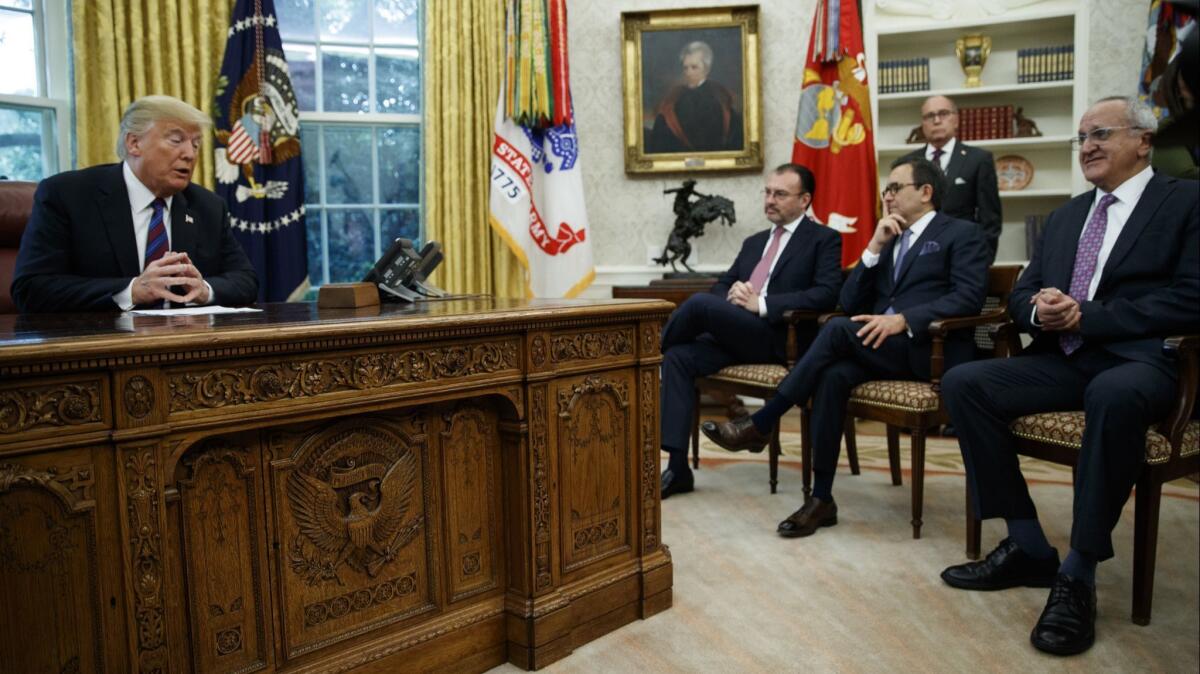Op-Ed: Mexico has Trump figured out

- Share via
If someone is holding a bomb and threatening to detonate it, the authorities may try to coax him into handing it over peacefully. If the authorities succeed, we should all commend them for their patience, not berate them for indulging the madman by engaging with him, or for failing to reply in kind to his insulting language.
Why then are so many people criticizing Mexico for allowing itself to be “used” by President Trump in this week’s (admittedly bizarre) announcement of a preliminary U.S.-Mexico trade deal? Mexico’s negotiators, working closely with their U.S. counterparts, and assisted by U.S. business interests and U.S. farm state legislators, managed to engage with an erratic president who’d bizarrely demonized Mexico since the first days of his campaign and threatened to blow up the North American Free Trade Agreement.
The White House press conference announcing the breakthrough was a fairly humiliating affair for all present not named Donald, and for the glaringly absent party from the proceedings, a large U.S. neighbor that is not Mexico. Trump rambled on to his pal “Enrique” (on speaker phone) about their close friendship, about how he’s often misunderstood, about how they don’t really need Canada anymore, and about how bad the old NAFTA was for the United States. Peña Nieto replied with that precise formalism that Latin American politicians have elevated to an art form, at one point acknowledging Trump’s (whom he called “Mr. President” throughout) “political will” to get the two countries to an agreement, though he must have mentioned the need to bring Canada into the fold about a dozen times.
Trump relishes the tactical drama far more than he cares about any strategic outcome.
Everyone playing a part in Trump’s charade (other than Trump himself) knew full well that this was not a “new” bilateral agreement that would supersede the bad old NAFTA, and knew that as a legal, economic and strategic matter Canada must remain a member of the North American trade bloc. They also appreciated, however, that the only way to break the impasse, and to get Trump to put down the proverbial bomb without detonating it, was to allow him his full-blown tantrum aimed at Canadian Prime Minister Justin Trudeau, who had somehow (no one is sure how exactly) offended the U.S. president earlier this summer in the aftermath of the G-20 Summit in Ottawa.
Critics who bashed Mexico’s leadership for going along with the White House’s charade missed the point. In dealing with Trump, as his staff well knows and foreign leaders are coming to appreciate, you endure tactical humiliations to preserve or secure larger strategic imperatives. Had Mexico insisted that it would not announce anything with the U.S. until Canada was fully on board, the tactical standoff would have likely encouraged Trump to scuttle NAFTA altogether.
Instead, so consumed by his desire to snub Trudeau on his reality show, Trump was willing to announce a deal with Mexico that is good for both countries. (Take that, Trump base, Mexico is part of what will Make America Great Again!)
Trump’s grudge indulged, Canadian and U.S. negotiators started racing to resolve the remaining differences between the two countries by Friday’s self-imposed deadline. And Trump was back to professing his love for Canada.
We were always bound to end up here. NAFTA will be modestly tweaked and updated, Trump will claim a hyuuuuge win and spin all sorts of tales to his base about how he completely altered the deal from the worst deal in human history to the absolute best, while globalists in Washington and New York and in Fortune 500 C-suites around the country will give a sigh of relief. We’re living, after all, in a time that accommodates parallel narratives.
Enter the Fray: First takes on the news of the minute from L.A. Times Opinion »
On the merits, the new NAFTA — or whatever Trump will insist we all call it — does accommodate some of the president’s populist grievances while updating it for the 21st century. The move to weaken the jurisdiction of extra-judicial arbitration panels, and to require that a certain percentage of autos produced within the trade bloc be made by higher-wage earners, are both concessions to Trump’s agenda.
(For what it’s worth, expanding the trade deal to encompass the digital economy, intellectual property and financial services are elements of the needed update that the Obama administration proposed via the Trans Pacific Partnership deal, but let’s not bring that up now.)
This ongoing NAFTA saga is the latest episode to shed light on what’s become Trump’s modus operandi. He likes to break things, blame others for the fact that they are broken and then take credit for “fixing” them. North Korea, family separations at the border, NATO, NAFTA … the pattern is clear. What’s also evident is that Trump relishes the tactical drama far more than he cares about any strategic outcome. He is quick to cave on substance if it makes everyone happy at the end of his TV show — so long, of course, as he gets the credit for making them happy.
Andrés Martinez is a professor of practice at the Walter Cronkite School of Journalism and Mass Communication at Arizona State University and a fellow at New America.
Follow the Opinion section on Twitter @latimesopinion or Facebook
More to Read
A cure for the common opinion
Get thought-provoking perspectives with our weekly newsletter.
You may occasionally receive promotional content from the Los Angeles Times.










